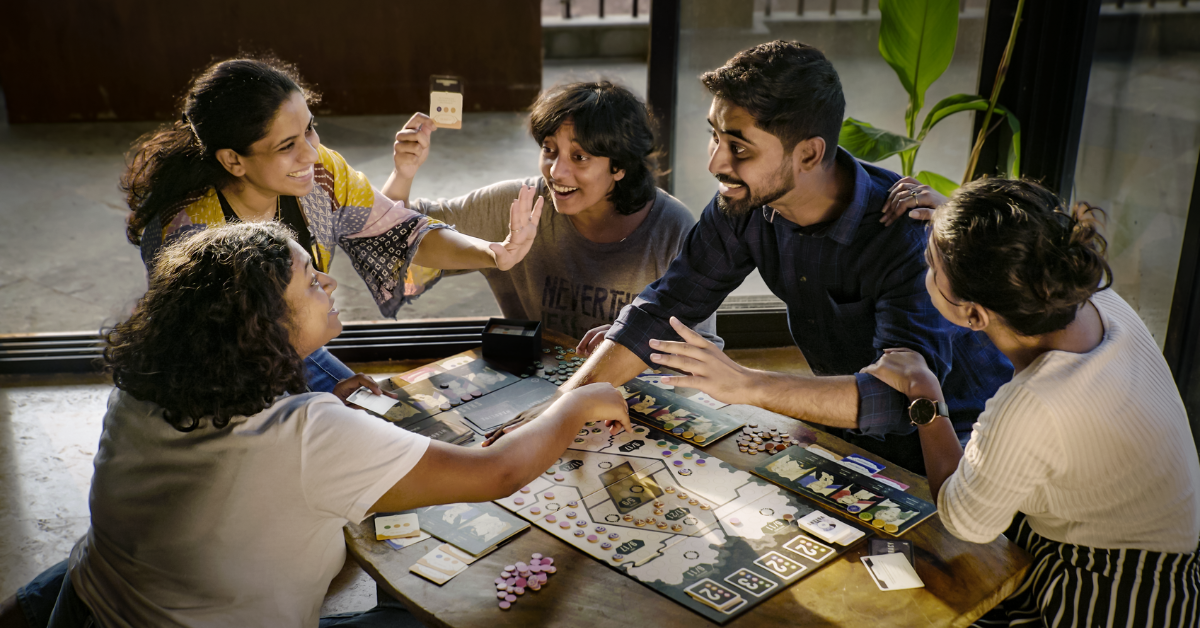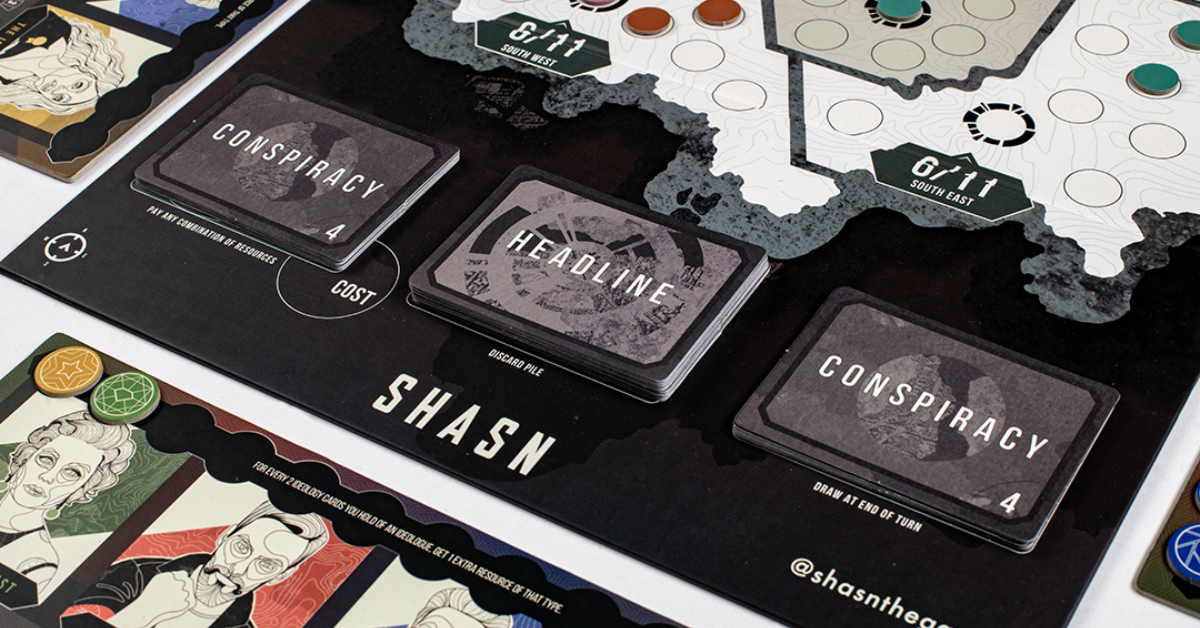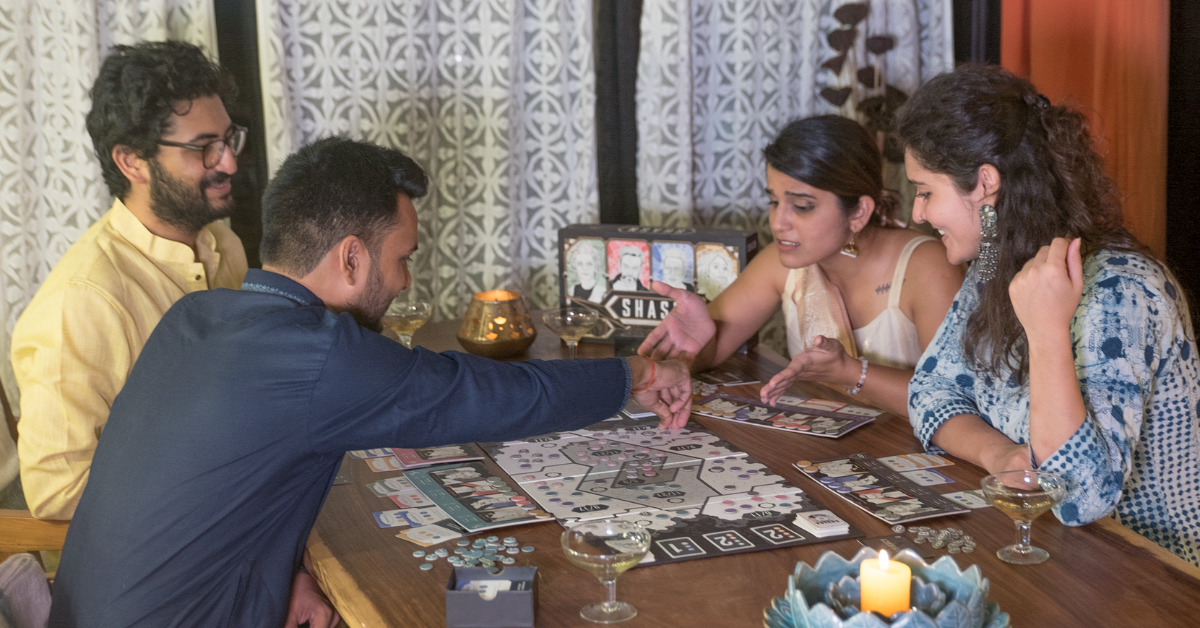
Board games are how I peel off work. Games like Unfair have taught me strategy, Clank has pushed me to take risks, and Project L is a better use of time than scrolling on Instagram.
Now, I socialise while rolling the dice. The pressure to fill the room with conversation is off, and the board gaming community has translated into adult friendships – we celebrate birthdays, achievements, and big and small festivals, all over a board.
The social aspect of board games is quite high. Think about it. Playing a board game together truly is an avenue to talk to someone and get to know them together.

Photo: Zain Memon
It’s this sentiment that led to Zain Memon to create board games that he hopes will replace Diwali taash parties. Card parties are all too common during the festival, especially in North India. But they are often limiting, especially for those who have little to no interest to play. This kind of play is also only meant for adults and that usually alienates kids, which doesn’t feel too festive, right? A board game, on the other hand, could mean kids and adults playing altogether.
Why then do board games not feature on our tabletops? Perhaps because the notion of who plays board games is skewed. There are two types of people, “[The first] think because as kids everyone played board games, [you don’t] play after you are slightly older. And then [the second] is a very small number of people who say ‘yeah, I play board games’ and then play Catan,” says Memon.
There is a third group, which is much smaller and that includes folks like Memon who are serious board gamers pursuing the hobby diligently. You will often find them huddled around a game at someone’s home, at board game cafes, game and toy expos, among other venues.
You can’t point out what draws adults towards board games. The rush is similar to what you would get after successfully solving a math equation as a kid. It’s also a great way to upskill, think creatively, and (in my opinion) a great way to socialise too. “Each part of the gaming experience brings a different flavour, a different mood. And sometimes, you just want to sit with your friends, not look at a screen, talk to each other, compete with each other, and have fun,” says Memon.
As a board game enthusiast, it’s not surprising when he tells me that years of gaming led to him creating SHASN, a board game about politics, ethics, and strategy. “I’ve been a gamer my entire life. I play every type of game, every format of gaming on every platform,” he says. Memon describes himself as someone who loves to turn his passions into vocations. His love for films, graphic novels, and board games is so large that he plays around with these mediums to create something that is his own.
Is India a pawn in gaming?
Speaking to Memon, it’s evident that he’s trying to create a shift in who plays these games. The task is daunting and a long way from the mainstream, but it is social events like Diwali parties that could help convert nascent gamers (read: the Catan-playing ones) into serious ones.
After all, India has a history of board gaming. The epic Mahabharata mentions a dice game Pachisi (also called Chaupar). Some stories also say that games like Snakes & Ladders and Ludo were first invented in ancient India. For a country that draws its customs from mythology, it’s odd that board game designing is only now picking up in India.
The government too has joined the crusade with efforts like Toycathon, an inter-ministerial initiative that invites young designers to conceptualise India-centric toys and games.
Paying for play

Photo credit: Shasn
There’s no doubt that India’s culture and history can pose as an exciting theme for a game. After all, it’s India and its politics that fascinated Memon to create SHASN. While producing a documentary film along with filmmaker Anand Gandhi, called An Insignificant Man by Vinay Shukla and Khusbo Ranka, Memon discovered how the political machinery worked first-hand. “We felt it was important to talk about that in more than one way,” he says. So, instead of talking to people about how politicians think, Memon decided to let his audience think like politicians. SHASN was eventually produced by Gandhi and published by Memesys Studios.
You would think an India theme would be enough to get people hooked on a game. But Memon reveals that a majority of his sales are from the West. What’s taking India so much time to catch the board game fever? It’s probably the price of the games (they cost anywhere between Rs. 3,000 to Rs. 20,000, or more) or that some games can go on for hours. Memon brings in a different perspective, “Modern [tabletop] board games also require a decent amount of space.”
You could argue that space crunch is an easy issue to resolve. But the high cost of designing games still looms. Most designers find that designing a card game – which can be cheaper – more challenging. A deck of 150 to 200 cards needs to offer a unique experience each time they are played without which the game becomes too simple. This was a challenge Memon faced while designing SHASN as well. The base version of the game includes around 200 custom-specific unique cards, and 500 cardboard tokens and at the time of its launch on Kickstarter, the editions were priced between $60-90 (Rs. 9,000 approx.). It took Memon six months to develop a cheaper version for India and the game is now priced at Rs. 3,499. You can buy the expansions separately to make the gaming experience more replayable.
Miniature moving
With government initiatives – like the Toycathon – underway, perhaps India-centric themes might help pique interest and ultimately ease the cost of production and design too. But game design, which Memon calls a science and an art, needs some work as well. Most international game designers have been board gamers since they were young and go on to receive a formal education in game design as well. The same cannot be said for the ones in India. Memon says, “The same way people need to learn how to make films and critique films and talk about films. [Game design] is not any different. And that requires a much richer ecosystem; it requires colleges, institutes, and study circles. Those attempts have begun. We really need to push the envelope. To not only catch up to what our peers are doing in the West or in the Far East but to surpass them.”
Is that enough to replace Teen Patti at Diwali parties and other festive get-togethers? It’s a start. The only way to see board games on people’s tabletops is “to create more products.” The enthusiasm to play will eventually seep in, “You make the best board games out there and you make them irresistible. We create a product that we believe in, that we believe is an amazing experience, and that draws people in. It creates a ripple effect of them talking to their friends about it.”

Photo: Shasn
Although Memon has simply relied on word-of-mouth to market SHASN. There are ample SHASN board game groups across several cities where you can go experience the game before you purchase it. Some months ago, Memon partnered with journalist Faye D’Souza to create the SHASN Debate Show hosted at G5A Warehouse in Mumbai. And, you’ll find several such activities including game design workshops to promote not just SHASN but also the board gaming culture at large. “I honestly do believe that the third wave of gaming is upon us. Now that the tool has been perfected, the craft has to be honed,” he says.
Gradually, the notion that board gaming is for kids is changing. As communities multiply and more games are designed, it’s time to put down the cards this Diwali and perhaps try to roll the dice.
Get started on board games
Zain Memon recommends board games you and your friends or family can play instead of Teen Patti on Diwali. You can buy these from Bored Game Company or Board Games India.
- SHASN – an epic game of politics, ethics, and strategy
- Avalon – a social deduction game that includes finger-pointing, and bluffing
- Dominion – the original deck-building game with new cards and strategies
- The Search For Planet X – an elegant logical deduction game with several interesting mechanics
- Unmatched – a fast-paced combat game; as easy to pick up as it is fun
- Barrage – a strategy game where you try to build the perfect game engine

